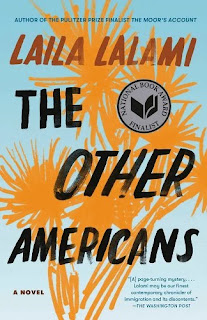Laila Lalami's 2019 novel The Other Americans has been on my radar for some time, but it wasn't until after I got to briefly chat with her and then introduce her (embarrassingly, I totally botched her name, but that's a story for another time) for a class she was teaching at StoryStudio earlier this year that I finally picked up her novel. And it wasn't until a recent conversation with a new friend -- the new friend who said it was the best book she'd read in a long time -- that I finally decided to read it.
I loved it. It's an amazing novel, for several reasons, not the least of which is that it's easy to tell how in the hands of any lesser a novelist, this would've been a mess. That's because Lalami writes from the point of view of at least 10 different characters. Even that isn't all that unusual. But what is unusual -- and even more unusual that it's done so well -- is that she writes all these characters in the first person. They all are unique and authentic, and this polyphony-in-narrative of a diverse set of voices and a diverse cast of characters makes this novel feel well-rounded and whole.
The story is about a Moroccan immigrant family living in a small town in the Mojave Desert near Palm Springs. At the beginning of the novel, the father is killed in a tragic hit-and-run accident outside of the diner he owns. Daughter Nora rushes home from Oakland to be with her family and begin trying to understand the senseless and seemingly randomness of this accident. But is it senseless? Is it random?
The novel unfolds in the aforementioned multiple voices -- Nora, Mora's mother, a police officer and Iraq veteran named Jeremy, the owner of the bowling alley next to the father's diner, and a Mexican immigrant who may have witnessed what happened, among several others. But it's not just a multi-narrator novel, it's also a multi-genre story. It is, at once:
- A mystery, then a MURDER mystery
- A coming-of-age story about finding your path, finding your voice, making art
- A story about sibling rivalry, parental expectations, and family dynamics
- A love story
- A war story
- A comment on mediocre white men, racism, sexism, and violence
- A story of an immigrant family colliding with American norms that make little sense to them.
Lalami pulls all this off in 300 pages. You often hear the term "tightly spun" bandied about fairly frequently, but I can tell you this novel is THE definition of a tightly spun narrative.
Some of the best books I've read this year have been couple-years-old novels (hello, The People We Keep, by Allison Larkin), and this one joins them. Enjoyed this immensely. Read this!


No comments:
Post a Comment